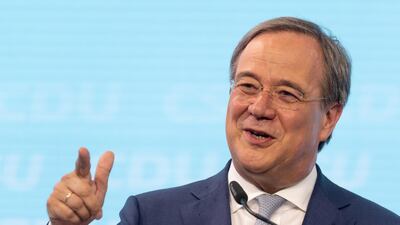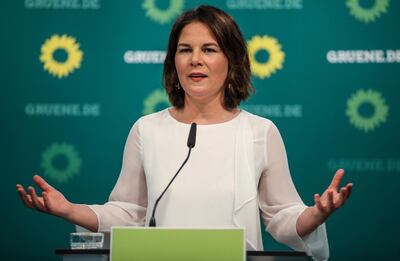Armin Laschet set out a key part of his pitch to be Germany’s next leader on Monday by vowing to protect the country’s economic strength, even as it pursues ambitious climate goals.
The race to succeed Chancellor Angela Merkel pits her party ally Mr Laschet against a Green party mounting its first bid to rule Germany, making climate change a key issue in September's election.
In a new manifesto, Mr Laschet and his Christian Democrats (CDU) tout themselves as the party that can deliver on economy and climate.
The manifesto calls for a decade of modernisation to make Germany a “climate-neutral industrial country” by 2045.
“Who can solve our economic problems? Who can adopt climate policies that don’t harm Germany’s competitiveness? I think people know that these are the core competencies of the CDU,” Mr Laschet said.
He told the Financial Times he wanted to safeguard jobs in key German industries, such as car manufacturing.
“Twenty per cent of the jobs are in industry. In the steel, chemical, auto industry,” he said. “Important economic sectors and key industries in our country. And we want them to still be there in 20 years.”
After a rocky start as CDU leader, which saw the Greens vault ahead in the polls, Mr Laschet regained ground in recent weeks.
Two new polls on Monday showed the CDU and its Bavarian sister party, the CSU, with a nine to 10-point lead over the Greens.
But with no prospect of any party winning an overall majority, the CDU and Greens could end up as coalition partners after the September 26 vote.
The parties already co-operate in some of Germany’s 16 states but have never formed a coalition at the national level.
This would mean tricky negotiations on issues such as the Nord Stream 2 gas pipeline, which Mr Laschet supports but the Greens oppose.
But “for the CDU the Greens are no longer the bogeyman they were,” Mr Laschet said.
Climate ambitions
A climate plan approved by Ms Merkel’s government last month targets a 65 per cent cut in emissions by 2030.
It came after a German court ruled that a previous climate law was not fit for purpose because it placed too great a burden on younger generations.
The CDU manifesto offers the same targets, which it says will help meet the aim of keeping global warming below 1.5°C.
It promises to develop electric vehicles, green hydrogen and new fuels for road transport.
The party also calls for carbon-neutral farms and stables, as well as a review of EU legislation on the protection of wolves.
But Mr Laschet came under fire from a lobby group called Campact which described him and the CDU as “climate blockers”.
It took out newspaper adverts with a 10-point list of climate measures which it said were opposed by Mr Laschet, including efforts to curb polluting cars.
Mr Laschet is the governor of a prominent coal state, North Rhine-Westphalia, and has previously rejected plans to raise costs for the industry.
Challenged about the CDU’s vague plans for carbon pricing, he said the aim was for it to be determined by the market rather than politicians.
Annalena Baerbock, the Green party's nominee for chancellor, said the CDU was closing its eyes to Germany’s problems.
“Prosperity with climate justice won’t just happen because we wish for it,” she said.
“It shows that this election will be a real decision about Germany’s direction.”



